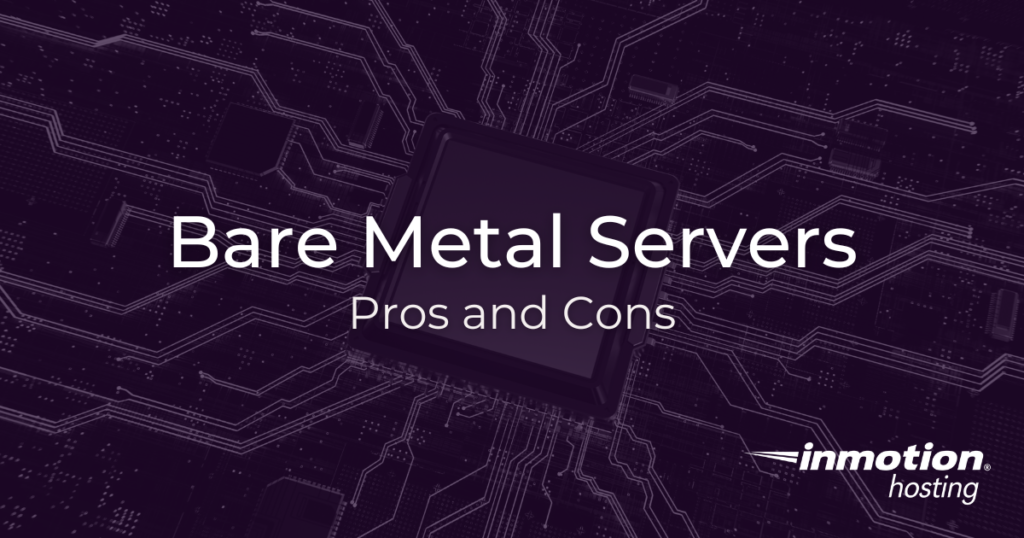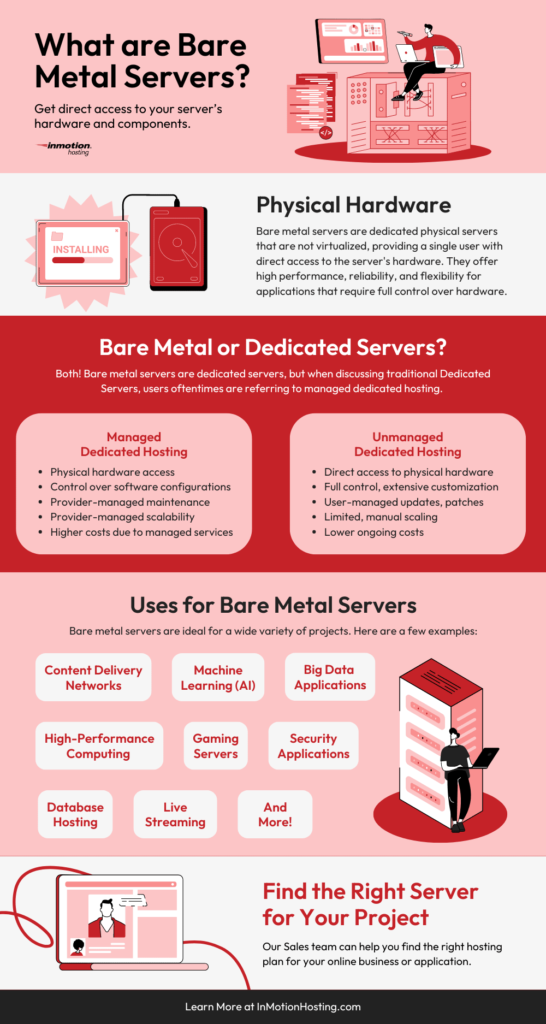
Bare metal dedicated servers are gaining popularity amongst businesses for their distinctive approach to providing computing resources, but what exactly are they?
Instead of purchasing a pre-configured CentOS server with cPanel and WHM already installed, Bare Metal Servers offer you the opportunity to customize the Dedicated Server to suit your individual needs.
In this article, we will explore the pros and cons of Bare Metal Servers, and how to learn if they are the right fit for your website or application.
- What are Bare Metal Servers?
- Pros and Cons of Bare Metal Servers
- Bare Metal vs Managed Dedicated Servers
- Bare Metal Use Cases
- Final Thoughts
What are Bare Metal Servers?
The term “bare metal server” is derived from the idea that the server operates directly on the “bare metal” or physical server hardware without any intervening virtual layers.
A bare metal server is a physical single-tenant hosting server on your provider’s data center. This type of server is distinct from virtualized or cloud server hosting, as it does not rely on a layer of virtualization to create the server environment.

In a traditional server setup, there are different levels of technology that separate the physical hardware from the software. This setup creates virtual computers, known as virtual machines, which run on a special program called a hypervisor. The hypervisor acts as a middleman between the software and the real hardware.
A bare metal server, on the other hand, doesn’t use any of these extra layers. It’s a physical server that is dedicated entirely to one user or organization, without the need of sharing its resources with anyone else.
Pros and Cons of Bare Metal Servers
Below we cover some of the advantages and disadvantages of using a physical machine for your application or website.
Advantages of Bare Metal Servers
- Improved Performance: With full access to your server’s hardware, you get the optimal performance for resource-intensive applications, such as high-performance computing (HPC), data analytics, and real-time processing.
- Customizability: From selecting the operating system that best suits your requirements to fine-tuning the network configuration, bare metal servers grant you the autonomy to tailor the server environment and resources (CPU, RAM, etc) to your precise specifications.
- Full Isolation: With your application residing on its own dedicated hardware, the risk of data breaches and unauthorized access is significantly mitigated, making this feature invaluable for businesses handling sensitive data.
Disadvantages of Bare Metal Servers
- Limited Scalability: Since bare metal hosting uses physical servers, installing and configuring new hardware components is required. This makes scaling servers a more time-consuming task.
- Longer Deployment Times Provisioning bare metal servers is a process that involves physical setup, resulting in longer deployment times compared to the near-instantaneous spin-up of virtual instances.
- Resource Underutilization: An inherent challenge with bare metal servers is the potential for resource underutilization during periods of low demand. Strategic workload planning and effective load balancing can help mitigate this challenge.
Bare Metal vs Managed Dedicated Servers
Bare metal servers are dedicated servers, as they only host one tenant; however they still differ from traditional managed servers.
The main difference between bare metal and managed dedicated servers is how they operate on their underlying hardware.
Bare metal provides a higher level of isolation and customization, making them ideal for high-performance tasks, but they require further technical knowledge of the server’s hardware and operation, whereas managed dedicated hosting is traditionally aided by their virtual layers.
Experience the Power of a Dedicated Server
Know you will always be able to reach your customers when you need to with reliable and secure Dedicated Hosting. Get industry-leading hardware at an affordable dedicated server price.
DDoS Protection
Free Backup Storage
cPanel or Control Web Panel
Managed Server
Unmetered Bandwidth
Bare Metal vs Virtual Machines (VMs)
As previously mentioned, a bare metal server is a physical computer dedicated entirely to one user, giving them full control over the machine’s hardware and resources.
In contrast, a VM runs on top of a physical server but uses software to create multiple virtual computers on the same hardware. Each virtual server operates as if it were its own computer, but they share the physical server’s resources.
Due to their virtualization setup, virtual machines (VMs) are the preferred choice for cloud computing in web hosting environments. However, compared to bare metal servers, VMs offer lower performance, less isolation, and limited customization.
Bare Metal vs. Flex Metal
Flex Metal refers to a virtual, cloud-based server platform that comes with a pre-configured operating system of your choice. This differs from standard cloud-based VPS platforms that only offer one operating system.
Flex metal hosting platforms let users quickly deploy and scale dedicated hardware on demand, often using automation and orchestration tools. This approach combines some of the control of bare metal with the flexible scalability of cloud hosting.
Having this in mind, flex metal plans will still be impacted by some limitations due to their shared cloud environment unlike the full hardware control provided by bare metal.
Bare Metal Use Cases
Understanding when to leverage the strengths of bare metal servers is essential. They excel in scenarios where uncompromising performance, enhanced security, and granular control are prerequisites.
High-Performance Computing (HPC)
Bare metal servers are instrumental in high-performance computing environments where processing power and speed are paramount. Industries such as scientific research, weather modeling, and financial simulations benefit from the raw computing power and low-latency access to hardware resources that bare metal servers provide.
Data-Intensive Applications
Applications dealing with vast amounts of data, such as big data analytics and large-scale databases, benefit from the dedicated resources and direct hardware access of bare metal servers. This ensures efficient data processing and reduces latency for critical operations.
Content Delivery Networks (CDN)
CDNs often leverage bare metal servers to ensure consistent and low-latency content delivery. The direct access to hardware resources allows for optimized content caching and delivery, improving the overall user experience.
Database Hosting
Hosting databases on bare metal ensures reliable and high-performance database operations. This is crucial for applications that rely heavily on database transactions, such as e-commerce platforms, content management systems, and enterprise resource planning (ERP) systems.
Gaming Infrastructure:
In the gaming industry, particularly for online multiplayer games and streaming platforms, bare metal servers provide the necessary computational power and low latency for a seamless gaming experience. They are capable of handling the demands of real-time processing and high concurrent user loads.
Don't ruin the game with lag! Get a server that offers the best gaming experience, performance, and processing power with Bare Metal Hosting!
Top-Tier Performance
Perfect for Gaming
Customizable
Dedicated Resources
Final Thoughts
Bare metal hosting offers a powerful solution for businesses that require high performance, complete control, and enhanced security. Their dedicated hardware ensures consistent and reliable performance for demanding applications.
However, the need for physical hardware installation and configuration can make scaling a more time-consuming and costly process compared to virtualized environments.
While bare metal servers are ideal for workloads requiring maximum performance and customization, they may not be the best fit for all use cases. You must carefully assess your specific needs, workload demands, and budget considerations to determine if bare metal servers are the right choice for your IT infrastructure.
Still unsure if bare metal is the right choice for your business? Our technical sales team is happy to help you choose the right hosting plan based on your needs.